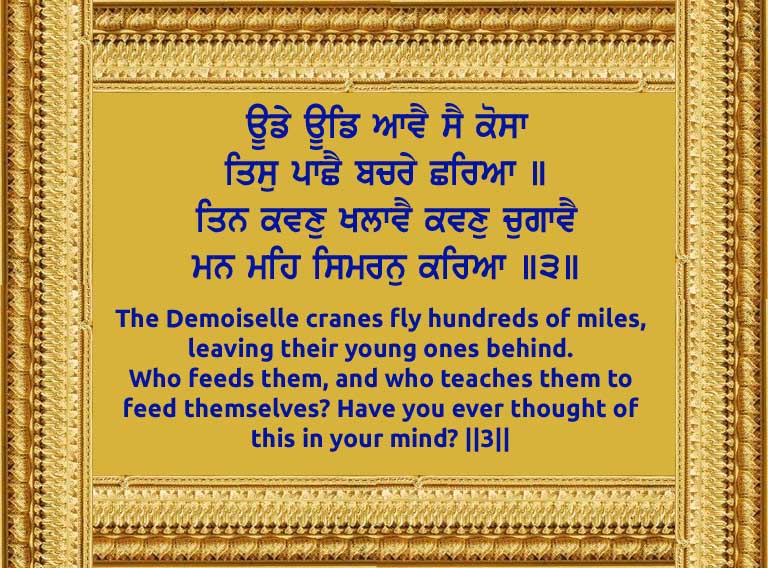The Power of Remembrance
The power of remembrance is very significant, but unfortunately little understood or researched. It helps us make meaning of our lives and sustains us with hopes amid hopeless situations, and meltdowns. Remembering is one of the things that make us human. Despite what is already known about the significance of the power of remembering, it is not emphasized enough. Gurbani reinforces the need and significance of Remembrance in our lives, says spiritually-inclined author Bhupinder Singh.
![The power of remembrance is very significant, but unfortunately little understood or researched. It helps us make meaning of our lives and sustains us with hopes amid hopeless situations, and meltdowns. Remembering is one of the things that make us human. Despite what is already known about the significance of the power of remembering, it is not emphasized enough. Gurbani reinforces the need and significance of Remembrance in our lives, says spiritually-inclined author Bhupinder Singh. THE 38 STANZAS OF JAPJI […]](https://www.theworldsikhnews.com/wp-content/uploads/2022/05/Gurbani-slider-Final-360x266.jpg)
THE 38 STANZAS OF JAPJI SAHIB ARE STEPPING RUNGS OF THE LADDER for merger with the One Power. The entire composition is an exposition of the significance of remembrance. The central theme of Guru Granth Sahib extols us to remember God with every breath as:
ਸਿਮਰਤ ਸਾਸ ਗਿਰਾਸ ਪੂਰਨ ਬਿਸੁਆਸ ਕਿਉ ਮਨਹੁ ਬਿਸਾਰੀਐ ਜੀਉ ॥
Translation: With every breath and morsel of food I remember Him in meditation. Thus, I have arrived at this conviction, that I should not ever forget Him from my mind.
-Guru Granth Sahib, Page 80
ਪ੍ਰਭ ਕੈ ਸਿਮਰਨਿ ਉਧਰੇ ਮੂਚਾ ॥
and
ਪ੍ਰਭ ਕੈ ਸਿਮਰਨਿ ਤ੍ਰਿਸਨਾ ਬੁਝੈ ॥
Translation: The remembrance of God is the highest and most exalted of all. In the remembrance of God, many are saved.
-Guru Granth Sahib, Page 263
From the above two references, the significance of remembrance is underscored. Guru Nanak Sahib has declared that besides remembrance all other pursuits are fruitless.
Significance of Remembrance
Guru Ji says remembrance makes me alive, and forgetting makes me dead in these words:
ਆਖਾ ਜੀਵਾ ਵਿਸਰੈ ਮਰਿ ਜਾਉ ॥
Translation: Remembering I live; forgetting I die.
-Guru Granth Sahib, Page 9
ਊਚ ਅਥਾਹ ਬੇਅੰਤ ਸੁਆਮੀ ਸਿਮਰਿ ਸਿਮਰਿ ਹਉ ਜੀਵਾਂ ਜੀਉ ॥੧॥
Translation: Highest of the High, Unfathomable, Infinite Lord and Master: Continually remembering You in deep meditation, I live. ||1||
-Guru Granth Sahib, Page 99
Guru Ji has equated living to remembrance. If that is true, then the opposite must also be true. That means forgetting is like dying. Sure enough, Guru Ji says:
ਪਰਮੇਸਰ ਤੇ ਭੁਲਿਆਂ ਵਿਆਪਨਿ ਸਭੇ ਰੋਗ ॥
Translation: Forgetting the Transcendent Lord, all sorts of illnesses are contracted
-Guru Granth Sahib, Page 135
The act of remembrance has been beautifully captured in a few words. Guru Ji’s words on remembrance of Akal Purakh are enlightening:
ਨਾਨਕ ਭਗਤਾ ਭੁਖ ਸਾਲਾਹਣੁ ਸਚੁ ਨਾਮੁ ਆਧਾਰੁ ॥
Translation: O Nanak, the hunger of the devotees is to praise Lord; the True Name is their sustenance.
-Guru Granth Sahib, Page 466
For Guru Ji, remembering the all-powerful God is the only food that nourishes him completely -body, mind, and soul. Soul food is the ultimate food which nourishes both mind and body, it provides bliss and aliveness to them. However, we have compartmentalized these. We consume food for our body’s nourishment, read books to get knowledge, which is food for the mind, but we do not provide any food to our soul?

That is the big perception gap between our and Guru Ji’s perceptions. In Guru Ji’s perception food for the soul becomes not only nourishment for the soul, but also for the body and mind. This is what Guru Ji wanted to share with mankind in his long journeys. Guru Ji has clearly spelt out that the only thing that he has to offer is Naam:
ਸਚਾ ਅੰਮ੍ਰਿਤ ਨਾਮੁ ਭੋਜਨੁ ਆਇਆ ॥
Translation: The Ambrosial Nectar of the True Name has become my food.
-Guru Granth Sahib, Page 150
When we are hungry or down, we look for comfort in food. Even when we entertain ourselves by watching movies or at social engagements, we use food to fill us and lift us up. The connection between the food for the soul and nourishment is explained by Gary Zukav in his book “The Heart of the Soul”. He says succinctly, “Emotional awareness is the first step in learning how to receive the nourishment the Universe provides for you.”
This is the first step Guru Ji taught us over 500 years back. Eating food can provide nourishment to the body, but it cannot drive away from the mind’s hunger. Guru Ji says remembrance is the food that provides complete nourishment and drives away all kinds of hunger. That food is remembrance, imbibed by singing it, which Guru Ji calls Keertan.

Keertan means singing praises in remembrance, it is not just listening to a genre of music, as a mood enhancer nor is it a passive act. However, if Keertan is being sung, participation of listeners is there, the melody is being enjoyed, words are understood, meaning is grasped, the connection is being built, and then the mind will be transported to another realm totally fulfilled. Keertan leads to remembering the creator. Guru Arjan Dev Ji posed this question about where remembrance takes place non-stop and then provided the answer himself.
ਸੋ ਅਸਥਾਨੁ ਬਤਾਵਹੁ ਮੀਤਾ ॥ ਜਾ ਕੈ ਹਰਿ ਹਰਿ ਕੀਰਤਨੁ ਨੀਤਾ ॥੧॥ ਰਹਾਉ ॥
Translation: Show me that place, O friend, where the Keertan of the Lord’s Praises is forever sung. ||1||Pause||
-Guru Granth Sahib, Page 385
Guru Ji has provided the answer to the question in these words:
ਸਾਧਸੰਗਿ ਹਰਿ ਕੀਰਤਨੁ ਗਾਈਐ ॥ ਇਹੁ ਅਸਥਾਨੁ ਗੁਰੂ ਤੇ ਪਾਈਐ ॥੧॥ ਰਹਾਉ ਦੂਜਾ ॥੭॥੫੮॥
Translation: In the Saadh Sangat, the Company of the Holy, sing the Kirtan of the Lord’s Praises.
-Guru Granth Sahib, Page 385
The feeling of ecstasy experienced in remembrance is expressed in Gurbani in these words:
ਤੁਧੁ ਚਿਤਿ ਆਏ ਮਹਾ ਅਨੰਦਾ ਜਿਸੁ ਵਿਸਰਹਿ ਸੋ ਮਰਿ ਜਾਏ ॥
Translation: When You come to mind, I am totally in bliss. One who forgets You just dies (spiritually).
-Guru Granth Sahib, Page 749
Remember -not to forget
Remembrance requires efforts through our attention and awareness. Remembering is sending a message that He is the most important in our life. The act of remembrance is an act of faith that brings us into the presence of God. It is simultaneously an act of reaffirmation of our trust in Him. The act of remembrance is an act of meditation as well. Guru Ji shares with us how to pray for remembrance in these words:
ਵਿਸਰੁ ਨਾਹੀ ਦਾਤਾਰ ਆਪਣਾ ਨਾਮੁ ਦੇਹੁ ॥ ਗੁਣ ਗਾਵਾ ਦਿਨੁ ਰਾਤਿ ਨਾਨਕ ਚਾਉ ਏਹੁ ॥੮॥੨॥੫॥੧੬॥
Translation: Never forget me, O Great Giver – please bless me with Your Naam. To sing Your Glorious praises day and night – O Nanak, this is my heartfelt desire. ||8||2||5||16||
-Guru Granth Sahib, Page 761
Forgetting doesn’t require any special efforts, it just happens naturally. It’s like the natural downwards gravitational pull. While remembering requires effort as if pulling upwards against the pull of gravity. About those who forget Guru Ji says:
ਵਿਸਰਿਆ ਜਿਨ੍ਹ੍ਹ ਨਾਮੁ ਤੇ ਭੁਇ ਭਾਰੁ ਥੀਏ ॥੧॥ ਰਹਾਉ ॥
Translation: Those who forget the Naam, the Name of the Lord, are a burden on the earth. ||1||Pause||
-Guru Granth Sahib, Page 488
It is imperative that we remind ourselves to remember our Creator to rise above the gravitational downward pull of forgetting.
Don’t forget to remember
We see that remembrance is not automatic but requires deliberate efforts. The human mind on average processes thousands of thoughts in a day -awake or asleep. So, imagine how easy it is to get swayed by these spontaneous thoughts. Therefore, having the thought of ‘not to forget’ is a very significant development, a result of efforts and blessings. Looking at the odds, we can say our mind can be our biggest stumbling block. However, if we can observe our mind, exercise supervisory control over it and stop it from being swept by the thoughts, it will be very significant growth. This can be initiated when we start observing our minds and monitoring the flow of thoughts. Every time we can catch it taking flight, we need to stop it from flowing with the thought by asking it to comeback:
ਕਹਾ ਚਲਹੁ ਮਨ ਰਹਹੁ ਘਰੇ ॥
Translation: Where are you going? O mind, remain in your own home.
-Guru Granth Sahib, Page 414

This kind of policing of the wandering nature of the mind will produce a calming effect. If we can manage it skillfully, and exercise measured control over it, then the mind can become our biggest ally. So, let us ask what needs to be done to remember:
ਹਰਿ ਜੀਉ ਆਗੈ ਕਰੀ ਅਰਦਾਸਿ ॥ ਸਾਧੂ ਜਨ ਸੰਗਤਿ ਹੋਇ ਨਿਵਾਸੁ ॥ ਕਿਲਵਿਖ ਦੁਖ ਕਾਟੇ ਹਰਿ ਨਾਮੁ ਪ੍ਰਗਾਸੁ ॥੯॥
Translation: I offer my prayer to the Lord, that I might dwell in the Saadh Sangat, the Company of the Holy. There, sins and sufferings are erased, and one is illumined with the Lord’s Name. ||9||
-Guru Granth Sahib, Page 415
Guru Ji has emphasized the role of the company of the holy, as it has a great influence on the flights of our thoughts. Guru Ji has shared this insight in these words:
ਜੈਸਾ ਸੇਵੈ ਤੈਸੋ ਹੋਇ ॥੪॥
Translation: They become just like the One they serve (through devotional service). ||4||
-Guru Granth Sahib, Page 223
Bhagat Kabir’s Bani in Guru Granth Sahib also endorses the significant influence of the company on the thoughts of a person in these words:
ਕਬੀਰ ਮਨੁ ਪੰਖੀ ਭਇਓ ਉਡਿ ਉਡਿ ਦਹ ਦਿਸ ਜਾਇ ॥ ਜੋ ਜੈਸੀ ਸੰਗਤਿ ਮਿਲੈ ਸੋ ਤੈਸੋ ਫਲੁ ਖਾਇ ॥੮੬॥
Translation: Kabir, the mind has become a bird; it soars and flies in ten directions. According to the company it keeps, and so are the fruits it eats. ||86||
-Guru Granth Sahib, Page 1369
So, the company of the spiritually inclined will nurture the same desire in us as well. That companionship will help us to soar to new heights in our inner development, which will improve work ethics and most important will help our spiritual journey. It is important that we inculcate the habit of ‘not forgetting to remember. The benefit of such an effort is depicted in these words:
ਚਿਤਹਿ ਚਿਤੁ ਸਮਾਇ ਤ ਹੋਵੈ ਰੰਗੁ ਘਨਾ ॥
Translation: When the consciousness is absorbed then great joy and bliss are found.
-Guru Granth Sahib, Page 1362
With the remembrance of the supreme consciousness through our own consciousness and awareness, we will experience an ever-increasing bliss in the process.
Practices – intentional, deliberate patterns of behaviour
Guru Ji has provided us with a beautiful example of practice of remembrance in these words:
ਊਡੇ ਊਡਿ ਆਵੈ ਸੈ ਕੋਸਾ ਤਿਸੁ ਪਾਛੈ ਬਚਰੇ ਛਰਿਆ ॥
ਤਿਨ ਕਵਣੁ ਖਲਾਵੈ ਕਵਣੁ ਚੁਗਾਵੈ ਮਨ ਮਹਿ ਸਿਮਰਨੁ ਕਰਿਆ ॥੩॥
Translation: The Demoiselle cranes fly hundreds of miles, leaving their young ones behind.
Who feeds them, and who teaches them to feed themselves? Have you ever thought of this in your mind? ||3||
-Guru Granth Sahib, Page 10
By providing an example of Demoiselle crane chicks left behind in the harsh Siberian winter, Guru Ji says that their sustenance is provided to them through the remembrance of their mothers. He poses the question by asking how they survive the harsh winter when they are all by themselves and don’t know how to look for food in midst of a snow carpeted landscape. Guru Ji says these Demoiselle cranes take a long flight to come to the Indo-Gangetic plains during winter months, leaving behind their tiny offspring as their bodies are not strong enough for the long arduous flights. These tiny fragile off-springs survive without leaving their nest in search of food. How? Guru Ji says mother crane remembers her offspring left behind, and in the process, the offsprings get their nourishment.

Guru Granth Sahib shares another example of turtles to illustrate the power of remembrance. After laying their eggs, turtles leave their eggs on the shore and return to the water. But the remembrance by the mother turtle provides the nourishment and the warmth to the eggs on the shore. Finally, when the eggs are hatched, the baby turtles come out by breaking the eggshell and joining their mother turtles in the water:
ਕੁੰਮੀ ਜਲ ਮਾਹਿ ਤਨ ਤਿਸੁ ਬਾਹਰਿ ਪੰਖ ਖੀਰੁ ਤਿਨ ਨਾਹੀ ॥
ਪੂਰਨ ਪਰਮਾਨੰਦ ਮਨੋਹਰ ਸਮਝਿ ਦੇਖੁ ਮਨ ਮਾਹੀ ॥੨॥
Translation: The mother turtle is in the water, and her babies are out of the water (in the sand). Babies have no wings (to fly in search of food), nor (the mother turtle) has teats (to provide milk to feed babies).
The Perfect Lord, the embodiment of supreme bliss, the Fascinating Lord takes care of them. See this, and understand it in your mind||2||
-Guru Granth Sahib, Page 488
These real-life observations powerfully underscore the power of remembrance, and simultaneously affirm the power of God, thus nurturing faith.
There is a significant reason to engage in remembrance and that is:
ਏ ਮਨ ਜੈਸਾ ਸੇਵਹਿ ਤੈਸਾ ਹੋਵਹਿ ਤੇਹੇ ਕਰਮ ਕਮਾਇ ॥
ਆਪਿ ਬੀਜਿ ਆਪੇ ਹੀ ਖਾਵਣਾ ਕਹਣਾ ਕਿਛੂ ਨ ਜਾਇ ॥੭॥
Translation: O mind, as you serve/follow, so do you become, and so are the deeds that you do and become. Whatever you yourself plant, that is what you shall have to eat; no one can violate this natural law. ||7||
-Guru Granth Sahib, Page 755
This same precept reverberates in the famous English idiom “As you sow so shall you reap.” When we hear, see, and feel the gift of remembrance the Gurus have left to us, we enter the realm of ecstasy. The embrace of remembrance transports us into a circular dance of time, where the past does not remain the past but is fashioned as present thus elevating the spirit. The act of remembrance builds positive feelings within. Guru Ji has expressed the benefit of remembrance in these words:
ਪ੍ਰਭ ਚਿਤਿ ਆਏ ਪੂਰਨ ਸਭ ਕਾਜ ॥
ਹਰਿ ਬਿਸਰਤ ਸਭ ਕਾ ਮੁਹਤਾਜ ॥੩॥
Translation: When God comes into my consciousness, all my affairs are successfully resolved.
Forgetting the Lord, one becomes subservient to all. ||3||
-Guru Granth Sahib, Page 802
Guru Arjan Dev Sahib has shared the benefits of remembrance succinctly for our inspiration to make remembrance a part of our daily life:
ਸਿਮਰਿ ਸਿਮਰਿ ਪ੍ਰਭ ਭਏ ਅਨੰਦਾ ਦੁਖ ਕਲੇਸ ਸਭਿ ਨਾਠੇ ॥
ਗੁਨ ਗਾਵਤ ਧਿਆਵਤ ਪ੍ਰਭੁ ਅਪਨਾ ਕਾਰਜ ਸਗਲੇ ਸਾਂਠੇ ॥੧॥
Translation: Remembering, remembering God in meditation, bliss ensues, and one is rid of all suffering and pain.
Singing the Glorious Praises of God, and meditating on Him, all my affairs have been fixed. ||1||
-Guru Granth Sahib, Page 625
Guru Ji sees that remembrance brings the divine power into our lives that he is not ready to forego it in any scenario:
ਸਰੀਰ ਸ੍ਵਸਥ ਖੀਣ ਸਮਏ ਸਿਮਰੰਤਿ ਨਾਨਕ ਰਾਮ ਦਾਮੋਦਰ ਮਾਧਵਹ ॥੫੦॥
Translation: Whether his body is healthy or sick, let Nanak meditate in remembrance of You, Lord.
-Guru Granth Sahib, Page 1358
Guru Ji asks us to pray for remembrance in these words:
ਕਬਹੂ ਨ ਬਿਸਰੈ ਹੀਏ ਮੋਰੇ ਤੇ ਨਾਨਕ ਦਾਸ ਇਹੀ ਦਾਨੁ ਮੰਗਾ ॥੨॥੧੫॥੧੦੧॥
Translation: May I never forget You from my heart; slave Nanak prays for this blessing. ||2||15||101||
-Guru Granth Sahib, Page 824
References:
1. Singh, Bhai Vir. Shree Guru Nanak Chamatkar. Vol. 1. Pages 120-123.
2. Zukav, Gary and Francis, Linda. The Heart of the Soul. (2001). Pages 231-232.
3. Singh, Kartar and Dhillon, G. S. Stories from Sikh History. Book III. Hemkunt Press (1994)
